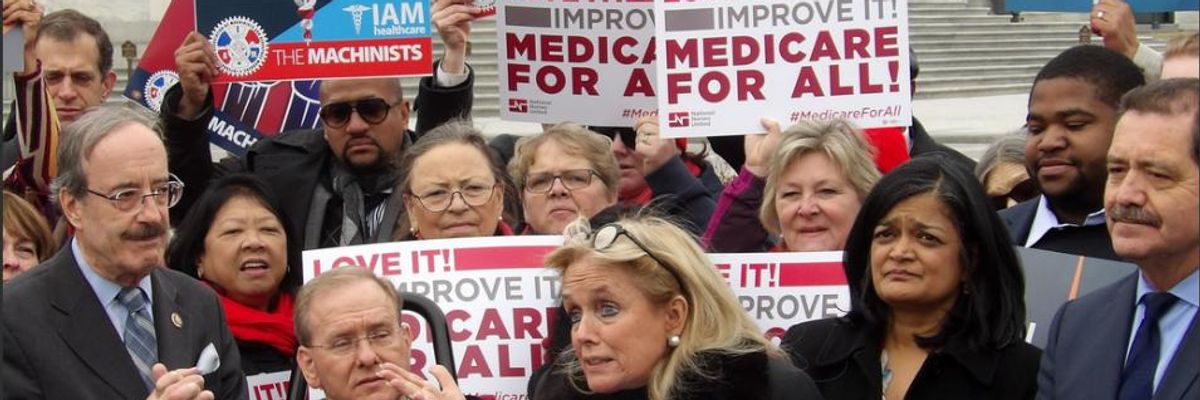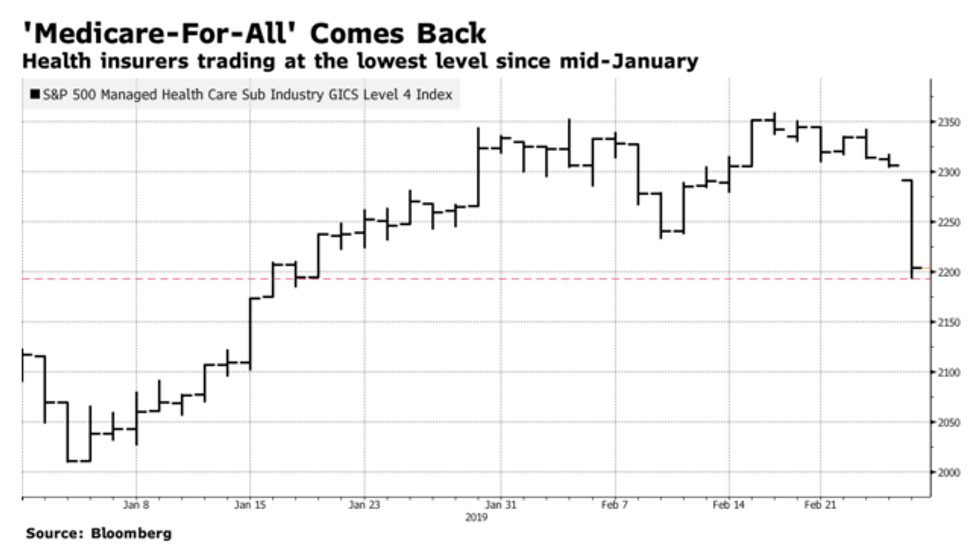
Rep. Pramila Jayapal (D-Wash.) officially introduced her Medicare for All legislation on Wednesday with the original support of more than 100 House Democrats. (Photo: Rep. Eliot Engel/Twitter)
Insurance Stocks Plunge as Medicare for All Bill Unveiled With Major Democratic Support
"Sorry not sorry," Rep. Pramila Jayapal, the legislation's lead sponsor, tweeted in response to the news.
Support for Medicare for All is rapidly gaining momentum in Congress--and insurance investors are starting to get nervous.
Health insurance stocks tanked on Wednesday as Rep. Pramila Jayapal (D-Wash.) introduced comprehensive Medicare for All legislation with the backing of more than 100 House Democrats and major progressive organizations, including America's largest nurses' union and national consumer advocacy groups.
"The S&P 500 Managed Health Care Index plunged as much as 4.9 percent, the most since Dec. 6, led by UnitedHealth Group Inc., Humana Inc., and WellCare Health Plans Inc.," Bloomberg reported after Jayapal unveiled her bill during an event on Capitol Hill. "Insurers UnitedHealth and Cigna Corp, which also own the country's largest pharmacy benefit managers, were both down about four percent."

Jayapal quickly made clear that she has no sympathy for the insurance industry, tweeting in response to the news, "Sorry not sorry."
Under Jayapal's plan, the U.S. would transition to a Medicare for All system over a period of two years, and private insurance would be nearly eliminated.
Dr. Adam Gaffney, president of Physicians for a National Health Program (PNHP), said in a statement on Wednesday that the "only way to achieve universal and comprehensive coverage is to eliminate the profits and waste of the private insurance industry, which drains hundreds of billions of dollars from our healthcare system each year."
With their profits under threat, the insurance and pharmaceutical industries are mounting a full-fledged and aggressive campaign to stop Medicare for All in its tracks. The Partnership for America's Health Care Future, a coalition formed by major pharmaceutical and insurance interests, is reportedly planning a "big nationwide effort" to undermine single payer's momentum and preserve the for-profit status quo.
To overcome the opposition of the deep-pocketed insurance industry, National Nurses United (NNU) and other grassroots organizations are planning a nationwide mobilization of their own in the coming weeks in an effort to defeat corporate power with a mass movement of ordinary Americans.
"This is a milestone in the fight for universal healthcare and an equitable society, where working people make the decisions that determine our destiny," Sanders Institute fellow Michael Lighty said of Jayapal's bill. "Now our task is to build a mass organization of working people that will not give up until we win."
An Urgent Message From Our Co-Founder
Dear Common Dreams reader, The U.S. is on a fast track to authoritarianism like nothing I've ever seen. Meanwhile, corporate news outlets are utterly capitulating to Trump, twisting their coverage to avoid drawing his ire while lining up to stuff cash in his pockets. That's why I believe that Common Dreams is doing the best and most consequential reporting that we've ever done. Our small but mighty team is a progressive reporting powerhouse, covering the news every day that the corporate media never will. Our mission has always been simple: To inform. To inspire. And to ignite change for the common good. Now here's the key piece that I want all our readers to understand: None of this would be possible without your financial support. That's not just some fundraising cliche. It's the absolute and literal truth. We don't accept corporate advertising and never will. We don't have a paywall because we don't think people should be blocked from critical news based on their ability to pay. Everything we do is funded by the donations of readers like you. Will you donate now to help power the nonprofit, independent reporting of Common Dreams? Thank you for being a vital member of our community. Together, we can keep independent journalism alive when it’s needed most. - Craig Brown, Co-founder |
Support for Medicare for All is rapidly gaining momentum in Congress--and insurance investors are starting to get nervous.
Health insurance stocks tanked on Wednesday as Rep. Pramila Jayapal (D-Wash.) introduced comprehensive Medicare for All legislation with the backing of more than 100 House Democrats and major progressive organizations, including America's largest nurses' union and national consumer advocacy groups.
"The S&P 500 Managed Health Care Index plunged as much as 4.9 percent, the most since Dec. 6, led by UnitedHealth Group Inc., Humana Inc., and WellCare Health Plans Inc.," Bloomberg reported after Jayapal unveiled her bill during an event on Capitol Hill. "Insurers UnitedHealth and Cigna Corp, which also own the country's largest pharmacy benefit managers, were both down about four percent."

Jayapal quickly made clear that she has no sympathy for the insurance industry, tweeting in response to the news, "Sorry not sorry."
Under Jayapal's plan, the U.S. would transition to a Medicare for All system over a period of two years, and private insurance would be nearly eliminated.
Dr. Adam Gaffney, president of Physicians for a National Health Program (PNHP), said in a statement on Wednesday that the "only way to achieve universal and comprehensive coverage is to eliminate the profits and waste of the private insurance industry, which drains hundreds of billions of dollars from our healthcare system each year."
With their profits under threat, the insurance and pharmaceutical industries are mounting a full-fledged and aggressive campaign to stop Medicare for All in its tracks. The Partnership for America's Health Care Future, a coalition formed by major pharmaceutical and insurance interests, is reportedly planning a "big nationwide effort" to undermine single payer's momentum and preserve the for-profit status quo.
To overcome the opposition of the deep-pocketed insurance industry, National Nurses United (NNU) and other grassroots organizations are planning a nationwide mobilization of their own in the coming weeks in an effort to defeat corporate power with a mass movement of ordinary Americans.
"This is a milestone in the fight for universal healthcare and an equitable society, where working people make the decisions that determine our destiny," Sanders Institute fellow Michael Lighty said of Jayapal's bill. "Now our task is to build a mass organization of working people that will not give up until we win."
Support for Medicare for All is rapidly gaining momentum in Congress--and insurance investors are starting to get nervous.
Health insurance stocks tanked on Wednesday as Rep. Pramila Jayapal (D-Wash.) introduced comprehensive Medicare for All legislation with the backing of more than 100 House Democrats and major progressive organizations, including America's largest nurses' union and national consumer advocacy groups.
"The S&P 500 Managed Health Care Index plunged as much as 4.9 percent, the most since Dec. 6, led by UnitedHealth Group Inc., Humana Inc., and WellCare Health Plans Inc.," Bloomberg reported after Jayapal unveiled her bill during an event on Capitol Hill. "Insurers UnitedHealth and Cigna Corp, which also own the country's largest pharmacy benefit managers, were both down about four percent."

Jayapal quickly made clear that she has no sympathy for the insurance industry, tweeting in response to the news, "Sorry not sorry."
Under Jayapal's plan, the U.S. would transition to a Medicare for All system over a period of two years, and private insurance would be nearly eliminated.
Dr. Adam Gaffney, president of Physicians for a National Health Program (PNHP), said in a statement on Wednesday that the "only way to achieve universal and comprehensive coverage is to eliminate the profits and waste of the private insurance industry, which drains hundreds of billions of dollars from our healthcare system each year."
With their profits under threat, the insurance and pharmaceutical industries are mounting a full-fledged and aggressive campaign to stop Medicare for All in its tracks. The Partnership for America's Health Care Future, a coalition formed by major pharmaceutical and insurance interests, is reportedly planning a "big nationwide effort" to undermine single payer's momentum and preserve the for-profit status quo.
To overcome the opposition of the deep-pocketed insurance industry, National Nurses United (NNU) and other grassroots organizations are planning a nationwide mobilization of their own in the coming weeks in an effort to defeat corporate power with a mass movement of ordinary Americans.
"This is a milestone in the fight for universal healthcare and an equitable society, where working people make the decisions that determine our destiny," Sanders Institute fellow Michael Lighty said of Jayapal's bill. "Now our task is to build a mass organization of working people that will not give up until we win."

